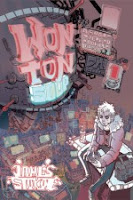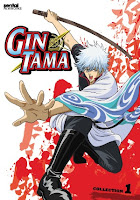My News and Reviews
Last week was the Oishinbo and Food Manga Moveable Feast, hosted by Khursten over at Otaku Champloo. Both of my posts last week had something to do with the Feast. First, I reviewed Oishinbo, A la Carte: Ramen & Gyōza, the third thematic Oishinbo collection to be released in English. I’m a foodie, so I really enjoy the series. My second post was Random Musings: Oishinbo and the Romance of Food in which I ramble on a bit about food, couples, and relationships.
Not too long ago, I read and reviewed Otaku Spaces, written by Patrick W. Galbraith with photography by Androniki Christodoulou. Recently Néojaponisme posted a three part interview with Galbraith about the book and otaku in general. It’s lengthy, but a good read. Elsewhere online, David Letters has an engaging article about Crying Freeman, sex scenes, and such at 4thletter!—Cartoonishly virile, absurdly smooth: The Crying Freeman Story. Finally, RightStuf announced the next book in their print-on-demand manga service, the eighth volume of Bizenghast by M. Alice LeGrow.
Quick Takes
 Bus Gamer: 1999-2001, The Pilot Edition by Kazuya Minekura. Toki, Nakajyo, and Kazuo are complete strangers that are hired to work together in a game of corporate espionage taken to the extreme. As far as I know, Minekura hasn’t been able to continue the Bus Gamer series although she has expressed interest in doing so. I’d love to see where she takes things; Bus Gamer has a solid start. The plot is a little bizarre, but I like the characters. I’m particularly fond of Kaz. He has some darkness in his past but has turned out to be very good natured and endearingly flaky. Although it’s only been hinted at so far, each of the young men have their own reasons for participating in what has become a deadly game.
Bus Gamer: 1999-2001, The Pilot Edition by Kazuya Minekura. Toki, Nakajyo, and Kazuo are complete strangers that are hired to work together in a game of corporate espionage taken to the extreme. As far as I know, Minekura hasn’t been able to continue the Bus Gamer series although she has expressed interest in doing so. I’d love to see where she takes things; Bus Gamer has a solid start. The plot is a little bizarre, but I like the characters. I’m particularly fond of Kaz. He has some darkness in his past but has turned out to be very good natured and endearingly flaky. Although it’s only been hinted at so far, each of the young men have their own reasons for participating in what has become a deadly game.
 Let Dai, Volumes 6-10 by Sooyeon Won. Dai absolutely terrifies me. Although no longer the leader of the Furies gang, he can still be incredibly violent. He does show brief moments of gentleness, but for the most part he scares the hell out of me (and quite a few of the other people in Let Dai.) And yet, he has this strange allure; people can’t help but be drawn to him, for better or, more often than not, for worse. One of the things that makes Let Dai so compelling, and so difficult to turn away from even though it’s almost traumatizing to read, is the complexity of the characters’ relationships and interactions. Some of the power dynamics are very strange. Occasionally the series can be a little melodramatic and angsty, but the resulting tragedies are very realistic.
Let Dai, Volumes 6-10 by Sooyeon Won. Dai absolutely terrifies me. Although no longer the leader of the Furies gang, he can still be incredibly violent. He does show brief moments of gentleness, but for the most part he scares the hell out of me (and quite a few of the other people in Let Dai.) And yet, he has this strange allure; people can’t help but be drawn to him, for better or, more often than not, for worse. One of the things that makes Let Dai so compelling, and so difficult to turn away from even though it’s almost traumatizing to read, is the complexity of the characters’ relationships and interactions. Some of the power dynamics are very strange. Occasionally the series can be a little melodramatic and angsty, but the resulting tragedies are very realistic.
 Wonton Soup, Volumes 1-2 by James Stokoe. I was recently introduced to some of Stokoe’s current illustrations and was so smitten that I immediately sought out any and all of his published works, which is how I discovered his short series Wonton Soup. Johnny Boyo is famous for his culinary talent but he left that life behind to become a space trucker instead. Wonton Soup is a pretty gimmicky series, one of the characters even comes out and declares it as such, but there are some moments of brilliant entertainment mixed in. I much preferred the first volume to the second simply because it focuses slightly more on Boyo’s crazy cuisine. Ultimately, there’s not much substance to Wonton Soup, but Stokoe’s art is great.
Wonton Soup, Volumes 1-2 by James Stokoe. I was recently introduced to some of Stokoe’s current illustrations and was so smitten that I immediately sought out any and all of his published works, which is how I discovered his short series Wonton Soup. Johnny Boyo is famous for his culinary talent but he left that life behind to become a space trucker instead. Wonton Soup is a pretty gimmicky series, one of the characters even comes out and declares it as such, but there are some moments of brilliant entertainment mixed in. I much preferred the first volume to the second simply because it focuses slightly more on Boyo’s crazy cuisine. Ultimately, there’s not much substance to Wonton Soup, but Stokoe’s art is great.
 Bodacious Space Pirates, Episodes 1-11 directed by Tatsuo Satō. Don’t let the title or the length of the skirts fool you, Bodacious Space Pirates is not at all the fanservice fest it looks like it might be. Instead, it’s an entertaining coming-of-age space opera that focuses on characters and storytelling. If anything, the story might be a little too innocent; the crew of the Bentenmaru are some of the nicest, most wholesome pirates I’ve ever seen. Still, I’m enjoying the show tremendously. Marika, a first-year in high school, discovers that she is the daughter of a space pirates after her father passes away. Even more surprisingly, she has been selected to succeed him as captain. Bodacious Space Pirates was such a fun, pleasant surprise. I’ll most likely pick up Sentai’s release.
Bodacious Space Pirates, Episodes 1-11 directed by Tatsuo Satō. Don’t let the title or the length of the skirts fool you, Bodacious Space Pirates is not at all the fanservice fest it looks like it might be. Instead, it’s an entertaining coming-of-age space opera that focuses on characters and storytelling. If anything, the story might be a little too innocent; the crew of the Bentenmaru are some of the nicest, most wholesome pirates I’ve ever seen. Still, I’m enjoying the show tremendously. Marika, a first-year in high school, discovers that she is the daughter of a space pirates after her father passes away. Even more surprisingly, she has been selected to succeed him as captain. Bodacious Space Pirates was such a fun, pleasant surprise. I’ll most likely pick up Sentai’s release.
 Gin Tama, Collection 1 (Episodes 1-13) directed by Shinji Takamatsu. I’m a fan of Hideaki Sorachi’s original Gin Tama manga, so I was surprised how long it took me to warm up to the anime adaptation. Both series are quirky with plenty of absurd humor. The sheer amount of Japanese cultural references makes them a hard sell for a casual audience since they’re not immediately accessible. Additionally, the first two episodes of the anime require that the viewers already be familiar with the manga in order to make any sense of it at all. But eventually, the anime started to work for me. I found myself laughing at the jokes, even the ones that I already knew, and I genuinely had a good time watching the show.
Gin Tama, Collection 1 (Episodes 1-13) directed by Shinji Takamatsu. I’m a fan of Hideaki Sorachi’s original Gin Tama manga, so I was surprised how long it took me to warm up to the anime adaptation. Both series are quirky with plenty of absurd humor. The sheer amount of Japanese cultural references makes them a hard sell for a casual audience since they’re not immediately accessible. Additionally, the first two episodes of the anime require that the viewers already be familiar with the manga in order to make any sense of it at all. But eventually, the anime started to work for me. I found myself laughing at the jokes, even the ones that I already knew, and I genuinely had a good time watching the show.
